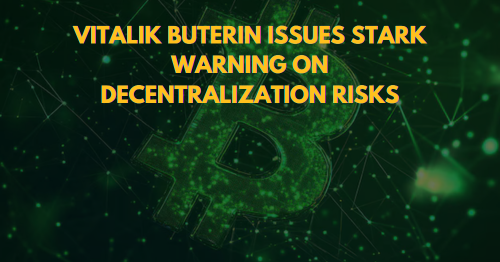Vitalik Buterin Issues Stark Warning on Decentralization Risks. In a bold and timely message, Vitalik Buterin has raised concerns about the growing threats to decentralization in the Web3 space. Speaking to a global audience of developers, investors, and users, the Ethereum co-founder highlighted the alarming trend of crypto projects portraying decentralization while retaining centralized control structures behind the scenes.
As blockchain adoption grows and institutional interest increases, Buterin cautioned that the core values of transparency, trustlessness, and user empowerment may be at risk.
Why Decentralization Still Matters
According to Vitalik Buterin, decentralization is not merely a marketing slogan—it is the foundation that secures blockchain networks against manipulation, censorship, and single points of failure. However, as Web3 matures, many platforms are reverting to centralized design patterns for the sake of convenience or compliance.
These compromises, Buterin warned, may fundamentally weaken the integrity and resilience of blockchain ecosystems like Ethereum.
The Three Tests of True Decentralization
To help both developers and users evaluate the legitimacy of decentralization claims, Vitalik Buterin outlined three essential tests every Web3 project should pass:
1. Walk-Away Test
Can users continue to interact with the system if the developers disappear? If an application breaks when its creators leave, it fails the walk-away test.
2. Insider Attack Test
How much damage can insiders do if they choose to act maliciously? Projects that give unchecked power to internal actors are inherently fragile.
3. Trusted Computing Base Test
How much of the system must a user trust without the ability to verify? The more bloated or opaque the codebase, the more vulnerable the network becomes.
By applying these tests, users can differentiate between truly decentralized platforms and those that only appear so on the surface.
The Pressure of Regulatory Compliance
Vitalik Buterin also addressed the increasing pressure from regulators, which he said is pushing some projects toward centralized governance. While regulation may be necessary for mainstream adoption, Buterin emphasized the need for regulatory frameworks that do not sacrifice the core tenets of decentralization.
He noted that giving in to centralized control—even temporarily—could open the door to long-term compromises that erode the very purpose of blockchain technology.
Centralization by Convenience
Another concern raised by Vitalik Buterin is the tendency of developers to choose centralized architecture to reduce complexity and accelerate time-to-market. While these shortcuts may benefit short-term growth, they lead to long-term vulnerabilities.
Examples include:
- Centralized front-end interfaces
- Custodial wallet solutions
- Admin-controlled smart contracts
These systems often fail the walk-away and insider attack tests, leaving users exposed and dependent on centralized teams.
Privacy Must Be a Design Principle
Buterin also criticized platforms that treat privacy as an afterthought. In his view, privacy must be integrated at the protocol level—not added on as a secondary feature.
He advocated for systems that include:
- Decentralized identity verification
- Encrypted communications
- Private transaction layers
These tools are essential for safeguarding user autonomy and preventing surveillance and data leaks in supposedly decentralized networks.
A Return to Ethereum’s Foundational Principles
At the core of Vitalik Buterin’s message is a call to return to Ethereum’s original mission: building systems that are open, inclusive, resilient, and verifiable.
He encouraged developers to:
- Keep codebases minimal and transparent
- Eliminate unnecessary dependencies
- Promote stateless architectures and light clients
- Empower users through on-chain governance
These measures, he argued, are vital for ensuring the long-term sustainability of decentralized networks.
Not Just a Developer Problem
While much of Buterin’s warning was aimed at developers and architects, he also urged users to educate themselves about the platforms they support. Users must question whether their favorite dApps or protocols could survive without a centralized team managing them.
“Don’t just ask if it’s decentralized,” Vitalik Buterin said. “Ask how it’s decentralized, and what happens if someone tries to break it.”
The Role of Investors and the Community
Investors, too, have a role to play. According to Vitalik Buterin, funding should be directed toward projects that align with long-term decentralization goals rather than short-term speculative returns.
He stressed that VC-backed platforms should not prioritize user acquisition at the expense of security and sovereignty. A sustainable blockchain future depends on robust community governance, verifiable trust models, and composability.
Conclusion
Vitalik Buterin’s warning on decentralization risks is not just a philosophical statement—it is a clear call to action. As Web3 technologies evolve, the temptation to cut corners, centralize control, and appease regulators will only grow stronger.
The challenge for the industry is to remain grounded in the principles that made blockchain revolutionary in the first place. True decentralization must be testable, transparent, and tamper-resistant. Anything less risks turning Web3 into just another version of the centralized internet it seeks to replace.
🔻 Top 3 Gainers (24h Performance)
- Fun (FUN) – $0.013806 (+29.71%)
FUN surged on renewed interest in entertainment-focused tokens, supported by a spike in trading volume after it was featured on a major crypto content platform. The token also benefited from speculation around potential integrations with gaming and betting dApps. - Gun (GUN) – $0.03232 (+16.19%)
GUN saw strong gains following the release of its tokenomics upgrade, which introduced a new staking model and burn mechanism. The update has improved investor sentiment and driven higher token utility within its native FPS gaming ecosystem. - Broccoli714 (BRO714) – $0.04381 (+13.85%)
BRO714 rallied as its environmentally themed NFT collaboration campaign gained traction. Community engagement across Telegram and Twitter increased significantly, attracting eco-conscious investors and meme coin enthusiasts alike.
🔻 Top 3 Losers (24h Performance)
- Parti (PARTI) – $0.1745 (−14.46%)
PARTI declined due to low user retention on its event ticketing dApp and lack of new platform partnerships. The token also faced downward pressure from recent whale sell-offs and reduced liquidity in secondary markets. - Ronin (RONIN) – $0.485 (−10.68%)
RONIN dropped as investor concerns grew around slowing NFT transaction volumes and delayed updates to the ecosystem’s core infrastructure. Some early holders have begun reallocating to alternative Layer-2 chains. - Init (INIT) – $0.04241 (−9.29%)
INIT lost value amid declining developer activity and a stalled community funding proposal. The project’s lack of clear roadmap updates has fueled uncertainty, resulting in fading investor confidence and reduced on-chain engagement.

I work as a content writer in the blockchain and cryptocurrency domain. I have a keen interest in exploring the world of digital assets, Web3, and emerging crypto technologies. My goal is to provide readers with easy-to-understand, engaging, and trustworthy insights, helping them stay informed and confident in the rapidly evolving world of crypto and blockchain.










